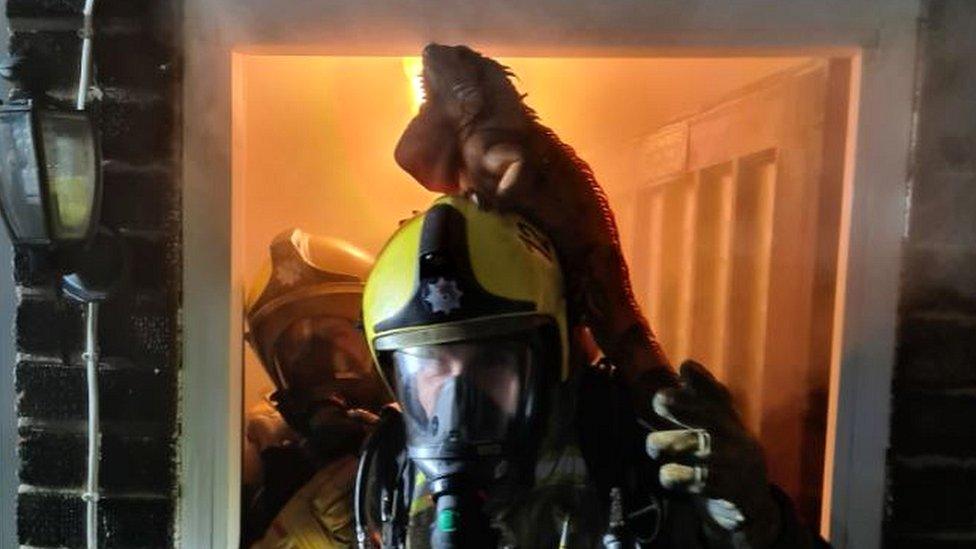Northamptonshire firefighter 'screeched' when iguana jumped on helmet
- Published

The iguana was carried to safety after jumping on top of firefighter Simon Everitt's helmet
A firefighter who unwittingly rescued an iguana from a blazing room after it leapt on to his helmet, has admitted he "may have screeched a little" when he realised the reptile was there.
Doris the iguana sought refuge on the head of Simon Everitt, as he fought flames in a Corby house on 6 January.
The pet escaped unscathed by hitching a ride on his helmet.
Mr Everitt, from Northamptonshire Fire and Rescue Service, said Doris was "a bit of a lump".
'A big clawed foot'
The living room of the house in Whitworth Avenue was smoke-logged when crews arrived shortly before midnight, Mr Everitt said.
He added there was very little visibility.
"You couldn't see your hand in front of your face," he said.
"As I was crawling around... I felt something on my head and I just thought it was [another crew member] searching around.
"Then, all of a sudden, the tail sort of moved in front of my helmet and I might have made a little screech... and then I had a big clawed foot scrape across my visor.
"[Doris] was a bit of a lump - it frightened me initially - but obviously I... got on with the job in hand."
As the crew made their way out of the house, Mr Everitt said his fellow firefighter spotted the iguana perched on his head and "wasn't sure whether to help, or just laugh".
He added the photograph of the rescue had "gone everywhere" on social media.
"I'd always dreamed of maybe females throwing themselves at me after joining the fire service - but sadly it was a scaly-type female called Doris," he said.
The blaze, which took hold at about 23:40 GMT, was caused by "a faulty reptile heated mat in the living room", the service concluded.
While there was some damage to the living room, the unhurt iguana was returned to her owner and there were no other injuries.
Allow X content?
This article contains content provided by X. We ask for your permission before anything is loaded, as they may be using cookies and other technologies. You may want to read X’s cookie policy, external and privacy policy, external before accepting. To view this content choose ‘accept and continue’.

Iguana fact file
Iguanas are native to Central and South America and are tropical, arboreal lizards
They can grow up to six feet (1.8m) in length and are herbivorous, feeding on jungle leaves, fruits and flowers in the wild
Young iguanas need daily feeding while large adult iguanas may only feed two to three times a week on a diet consisting of, among other things, dark green, leafy vegetables, carrots, tomatoes, melon and bananas
A mature iguana can weigh as much as 15lbs (6.8kg) and the reptiles can be difficult to handle as they have razor-sharp teeth, claws and a lashing tail
The athleticism of the iguana came to the attention of the world when a hatchling marine iguana was filmed narrowly escaping racer snakes in the BBC's Planet Earth II - the film won a Bafta award


Find BBC News: East of England on Facebook, external, Instagram, external and Twitter, external. If you have a story suggestion email eastofenglandnews@bbc.co.uk
- Published8 January 2021
